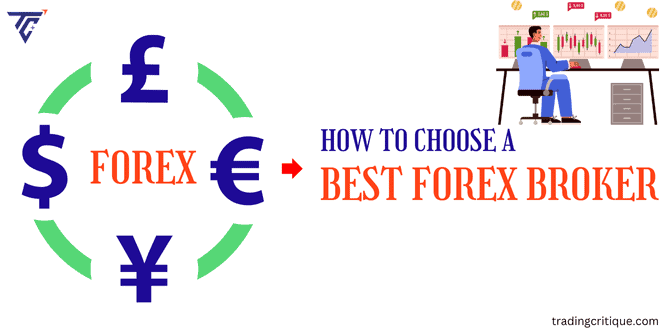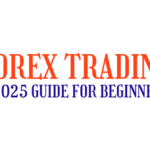In the ever-evolving world of forex trading, selecting the right broker is pivotal to your trading success. Whether you are a seasoned trader or a newcomer to the forex market, choosing the best forex broker can significantly influence your trading experience and outcomes.
How to determine a good broker this comprehensive guide will walk you through the essential factors to consider when selecting a forex broker, helping you make an informed decision that aligns with your trading goals and preferences.
Quick insights
How do I choose a forex broker?
Forex trading, or foreign exchange trading, involves the buying and selling of currencies to profit from fluctuations in exchange rates. As the largest and most liquid financial market globally, forex offers immense profit opportunities.
However, success in forex trading does not exclusively depend on your trading skills; it also depends on selecting a reliable forex broker who acts as your intermediary between the financial markets and your trading activities.
A forex broker provides you with access to the forex market, trading tools, and resources. A good broker ensures a secure and efficient trading environment, while a poor choice can adversely affect your trading performance, regardless of your expertise or strategy.
How to choose a forex broker
Choose a forex broker that is well regulated, reputable, and offers competitive trading fees. Meeting these criteria increases your chances of long-term profitability.
- Order execution speed defines how quickly trades filled.
- Slippage means the difference between the expected and executed price.
- The mobile trading app is convenient for on-the-go trading.
- Research tools are used for fundamental and technical analysis resources.
- Customer reviews and ratings are helpful to know feedback from other traders.
- The withdrawal process needs to be easy and speed of withdrawing funds.
- Security measures evolve Protection of personal and financial information.
- Negative balance protection is advisable to protect against losses exceeding account balance.
Risks associated with forex trading
Forex trading involves significant risks, including the potential loss of your invested capital. It is essential to trade responsibly and only invest money you can afford to lose. Implementing proper risk management strategies and maintaining a disciplined approach can help mitigate these risks.
9 steps to consider when choosing a broker
What to consider when choosing a broker choosing a broker involves evaluating several critical factors. Here is a detailed look at what you should consider,
1. Regulation and licensing
Regulation is one of the most important aspects of choosing a forex broker. Regulatory bodies ensure that brokers adhere to strict standards, safeguarding your investments and ensuring fair trading practices.
Why regulation matters
Regulated brokers are required to keep client funds in segregated accounts, maintain transparency, and provide fair arbitration in case of disputes.
How to verify the regulation
Verify the broker’s regulatory status on the official websites of these regulatory bodies to ensure they are in good standing.
Check if reputable financial authorities regulate the broker.
- The Financial Conduct Authority FCA in the UK
- The Australian Securities, And Investments Commission ASIC
- The Cyprus Securities and Exchange Commission CySEC
- FCA – Financial Conduct Authority
- BaFin – Federal Financial Supervisory Authority, Germany
- MAS – Monetary Authority of Singapore
- ASIC – Australian Securities and Investments Commission
- NFA – National Futures Association USA and
- CFTC – Commodity Futures Trading Commission USA
2. Security measures
Ensuring the security of your funds and personal information is paramount. A reputable broker should implement robust security measures to protect your data and investments.
Security features
- Look for brokers that use advanced encryption technologies and secure account management practices.
- Verify that the broker’s platform is protected against unauthorized access and potential cyber threats.
3. Trading platforms and tools
The trading platform is your primary interface for executing trades and analyzing the market. A good platform should be user-friendly, feature advanced charting tools, and offer fast execution speeds. It should also be stable and capable of handling high volumes of trading activity without holdup or stoppage.
Popular platforms
- MetaTrader 4 (MT4) and MetaTrader 5 (MT5) are among the most popular trading platforms due to their powerful features and ease of use.
- Many brokers offer these platforms, but some also provide proprietary platforms with unique features.
- Evaluate the platform’s capabilities, including analysis tools, technical indicators, and order execution options.
4. Currency pairs offered
A diverse range of currency pairs provides more trading opportunities and flexibility. Look for a broker that offers a real-time broad selection of currency pairs, including major, minor, and exotic pairs. This variety allows you to explore different trading strategies and capitalize on various market conditions.
Evaluating currency pairs
- Consider your trading strategy and preferences when evaluating the available currency pairs.
- Ensure that the broker offers the pairs you are interested in and that they align with your trading goals.
5. Leverage and margin
Leverage allows traders to control larger positions in the market with a smaller amount of capital. While leverage can amplify profits, it also increases risk. A good broker provides flexible leverage options and educates traders on the responsible use of leverage.
Margin requirements
- Check the broker’s margin requirements and leverage ratios.
- Ensure they offer leverage levels that suit your trading style and risk tolerance.
- Be aware of how leverage affects your potential gains and losses and use it carefully to manage risk effectively.
6. Account types
Different traders have varying needs and preferences. A good broker offers multiple account types, such as standard, mini, micro, and managed accounts. Each account type caters to different trading styles, experience levels, and financial situations.
Choosing the right account
- Select an account type that matches your trading goals and financial capacity.
- Consider factors such as minimum deposit requirements, account features, and trading conditions.
- If you are unsure which account type suits you best, consult with the broker’s account manager for guidance.
7. Types of trading costs
Forex trading involves several costs, including spreads, commissions, and swap rates. Lower trading costs can enhance your overall profitability. Evaluate the broker’s fee structure to ensure it aligns with your trading strategy and frequency.
Comparing costs
- Compare trading costs across different brokers and assess how they affect your potential returns.
- Look for brokers that offer competitive spreads and low commissions.
- In addition, check for any hidden fees or additional charges that could affect your trading costs.
8. Educational Resources
Educational resources are essential for traders at all levels. They provide valuable insights, strategies, and market analysis that can enhance your trading skills and decision-making.
Types of resources
- Look for brokers that offer comprehensive educational resources, including webinars, tutorials, eBooks, and market analysis.
- Access to expert commentary and trading strategies can help you stay informed and improve your trading performance.
9. Customer support
Effective customer service is fundamental for addressing any issues or questions that may arise during your trading activities. Look for brokers that offer responsive and efficient customer service.
Evaluating support services
- Check the availability and quality of customer support services.
- Perfectly, support should be available 24/5 through various channels, including live chat, email, and phone.
- Evaluate the support team’s responsiveness and professionalism to ensure prompt assistance when needed.
Tips for successful forex trading
To succeed in forex trading, consider the following tips,
Develop a strategy
Create a well-defined trading strategy that includes your goals, risk management rules, and trading plan. A solid strategy helps guide your trading decisions and improves consistency.
Manage risk
Use risk management tools like stop-loss orders and diversify your trades to minimize potential losses. Effective risk management protects your capital and helps mitigate risks.
Stay informed
Keep up with market news, economic events, and trends that can affect currency prices. Staying informed allows you to make timely and informed trading decisions.
Continuous learning
Commit to ongoing education and self-improvement. The forex market is dynamic, and continuous learning helps you adapt to changing conditions and refine your trading skills.
Conclusion
Choosing the best forex broker is an essential decision that can significantly affect your trading experience and success. By considering factors such as regulation, trading platforms, account types, trading costs, and customer support, you can make an informed choice that aligns with your trading goals.
Calculate your options carefully, and select a broker that meets your needs and enhances your trading potential. In summary, taking the time to research, and choose the right forex broker is a critical step in achieving success in the forex market. With the right broker by your side, you can navigate the complexities of forex trading with confidence and work towards achieving your financial goals.
Pro Tip
Choosing the best forex broker involves thorough research. Prioritize brokers with strong regulation and licensing, robust security measures, and user-friendly trading platforms. Assess their currency pair offerings, leverage options, and account types. With our trusted forex brokers, you can explore these factors in-depth and build a reliable trading foundation.
Frequently asked questions
1. Do I need a broker?
Yes, you need a broker to trade Forex or other financial assets. Trading Forex through a department change is not practical due to high fees, which can erode profits from frequent trading.
2. Can a Forex broker steal your money?
While it is unlikely, a regulated broker is highly unlikely to steal your money. However, issues with withdrawing funds might arise, so it is important to choose a well-regulated and reputable broker.
3. What makes a good Forex broker?
A good Forex broker should offer competitive trading fees, efficient trade execution, and maintain honesty and transparency in its operations.
4. What factors should I consider when selecting a Forex broker?
Key factors include the broker’s regulation and security, trading costs, and the wide range of assets offered. Use these criteria to narrow down your options and evaluate brokers on additional details.






